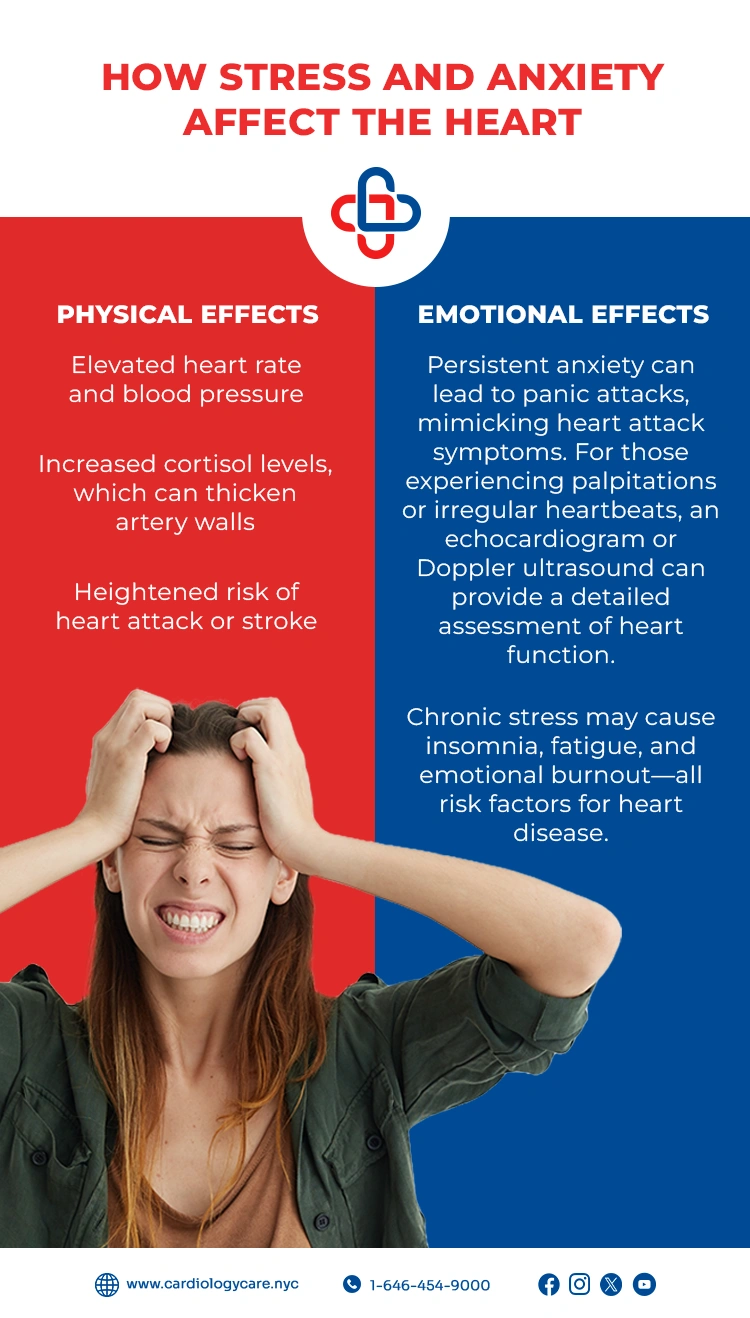You feel your heart racing, your chest tightens, and your mind starts to spin. Is it just stress or something more serious? Understanding how stress and anxiety impact your heart could be the key to protecting it.
Stress and anxiety are more than just emotional states—they’re also significant risk factors for heart disease. Recognizing symptoms, managing stress effectively, and seeking timely medical advice, such as comprehensive cardiovascular screenings at Cardiology Care NYC, can be life-saving.
Table of contents
Stress vs. Anxiety: What’s the Difference?
At Cardiology Care NYC, we understand that stress is typically a short-term response to external pressures or triggers. In contrast, anxiety is more persistent, often unrelated to a specific cause, and can linger for weeks or months.
Common Symptoms:
- Stress: Rapid heartbeat, muscle tension, irritability
- Anxiety: Restlessness, chest pain, feeling overwhelmed
Why It Matters:
Chronic stress and anxiety strain the heart, raise blood pressure, and heighten cardiovascular risk. Regular blood pressure screenings help manage stress-related hypertension with comprehensive assessments.
How Stress and Anxiety Affect the Heart
Physical Effects:
- Elevated heart rate and blood pressure
- Increased cortisol levels, which can thicken artery walls
- Heightened risk of heart attack or stroke
Emotional Effects:
- Persistent anxiety can lead to panic attacks, mimicking heart attack symptoms. For those experiencing palpitations or irregular heartbeats, an echocardiogram or Doppler ultrasound can provide a detailed assessment of heart function.
- Chronic stress may cause insomnia, fatigue, and emotional burnout—all risk factors for heart disease.
What Is a Stress Test? How It Can Assess Heart Health
A stress test, one of the key services offered at Cardiology Care NYC, evaluates how the heart responds to physical exertion or medical stimulation. Additionally, Holter monitoring can provide 24-48 hours of continuous heart rhythm tracking, while Nuclear cardiology offers a comprehensive view of blood flow and heart function under stress. It can help differentiate between anxiety and a cardiac event.
Types of Stress Tests:
- Exercise Stress Test: Walking on a treadmill while monitoring heart function.
- Nuclear Stress Test: Imaging to check blood flow and detect blockages.
- Chemical Stress Test: Medications simulate physical exertion.
Ways to Manage Stress and Anxiety for Heart Health
Breathing Techniques:
Practice deep breathing or box breathing to lower heart rate and reduce cortisol levels.
Mindfulness and Meditation:
Just 5-10 minutes of daily meditation can significantly lower stress levels.
Exercise:
Moderate exercise like walking or yoga helps release endorphins and reduce blood pressure.
Diet and Sleep:
- Eat anti-inflammatory foods (e.g., omega-3s, leafy greens).
- Prioritize sleep to prevent stress and reduce heart risk.
Therapy and Support:
- Chronic stress or anxiety? A cardiology consultation at Cardiology Care NYC can offer a custom care plan. CBT is also helpful for managing anxiety.
- Join a support group for stress or heart health.
When to Seek Help
Seek immediate medical attention if you experience:
- Severe chest pain or tightness
- Shortness of breath
- Numbness or tingling in the arm
- Sudden dizziness or confusion
If you have chest pain, shortness of breath, or numbness, Cardiology Care NYC offers diagnostic tools like the holter monitor, echocardiogram, and stress tests. For those with heart disease or high blood pressure, our specialists can create a personalized care plan.
Conclusion
Stress and anxiety impact more than your mood—they can harm your heart. Managing them is key to protecting both mental and heart health.
If you’re feeling overwhelmed, talk to your doctor. Cardiology Care NYC offers stress tests and personalized heart care plans to help you feel better and stay healthy.
Frequently Asked Questions
Can Anxiety Worsen Heart Disease?
Yes, it raises blood pressure and inflammation, increasing cardiovascular risks.
Does Poor Sleep Affect Heart Health?
Absolutely. Stress-induced insomnia can elevate heart rate and blood pressure.
Can Stress Raise Cholesterol?
Yes, chronic stress can increase LDL and lower HDL, promoting artery plaque buildup.
Are Panic Attacks Dangerous for the Heart?
Not directly, but frequent episodes can stress the heart, especially in those with heart conditions.
Can Stress Cause Heart Palpitations Without Heart Disease?
Yes, stress can trigger palpitations even in healthy hearts.
Disclaimer
This blog is for informational & educational purposes only and does not intend to substitute any professional medical advice or consultation. For any health-related concerns, please consult with your physician, or call 911.

